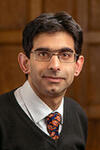Nilay Hazari
Nilay Hazari is currently the John Randolph Huffman Professor of Chemistry at Yale University. He received a BSc (2002), majoring in chemistry, and a MSc (2003) in inorganic chemistry working with Professor Leslie D Field at the University of Sydney. He then completed a D. Phil in inorganic chemistry (2006) at the University of Oxford as a Rhodes Scholar. His doctoral supervisor was Professor Jennifer C Green. He finished his formal education by working for three years (2006-2009) as a postdoctoral scholar under the supervision of Professor John E Bercaw and Dr. Jay A Labinger at the California Institute of Technology. In 2009, he started his independent career at Yale. His primary research focus is the mechanism-based design of homogeneous transition metal catalysts for the synthesis of fine and commodity chemicals and fuels. His approach to developing new catalysts involves detailed experimental and theoretical studies of reaction mechanisms. These studies provide guidance on how to modify current catalysts and design new catalysts, which are more active and selective for existing and novel transformations.
To date his group has developed state-of-the-art catalysts for the hydrogenation of carbon dioxide to formic acid and methanol, the dehydrogenation of formic acid and methanol to carbon dioxide and hydrogen, and palladium and nickel catalyzed cross-coupling. His group has developed more than 10 commercially available reagents for catalysis, and his precatalysts for palladium catalyzed cross-coupling are commercially available on a kilogram scale.
Professor Hazari has received a number of awards including the American Chemical Society Harry Gray Award for Creative Work in Inorganic Chemistry by a Young Investigator (2017), the Arthur Greer Memorial Prize for Outstanding Scholarship by Junior Faculty Members in the Social Sciences and Sciences at Yale University (2015), the Camille and Henry Dreyfus Teacher Scholar Award (2014), and the National Science Foundation Career Award (2012). In 2020, he was elected to the Connecticut Academy of Science and Engineering, in 2013 he was named an Alfred P. Sloan Research Fellow, and in 2012 an Organometallics Fellow (from the American Chemical Society Journal Organometallics).
